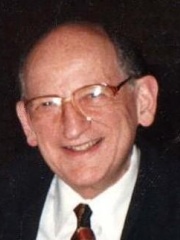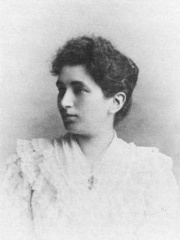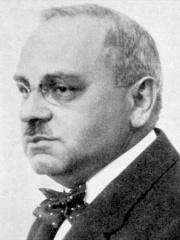
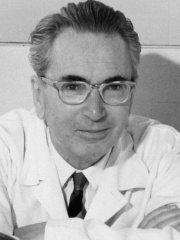
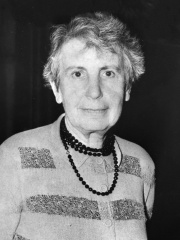
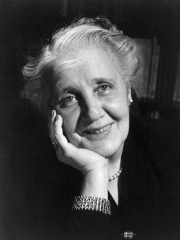
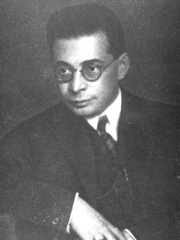
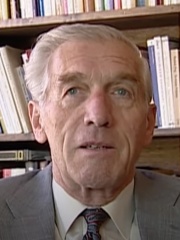
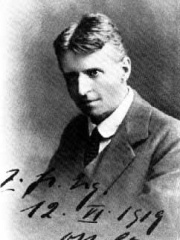
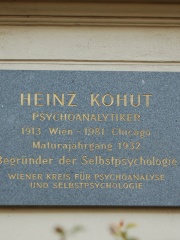
The Most Famous
PSYCHOLOGISTS from Austria
This page contains a list of the greatest Austrian Psychologists. The pantheon dataset contains 235 Psychologists, 16 of which were born in Austria. This makes Austria the birth place of the 4th most number of Psychologists behind Germany, and United Kingdom.
Top 10
The following people are considered by Pantheon to be the top 10 most legendary Austrian Psychologists of all time. This list of famous Austrian Psychologists is sorted by HPI (Historical Popularity Index), a metric that aggregates information on a biography's online popularity. Visit the rankings page to view the entire list of Austrian Psychologists.

1. Alfred Adler (1870 - 1937)
With an HPI of 81.23, Alfred Adler is the most famous Austrian Psychologist. His biography has been translated into 78 different languages on wikipedia.
Alfred Adler ( AD-lər; Austrian German: [ˈalfreːd ˈaːdlɐ]; 7 February 1870 – 28 May 1937) was an Austrian medical doctor, psychotherapist, and founder of the school of individual psychology. His emphasis on the importance of feelings of belonging, relationships within the family, and birth order set him apart from Freud and others in their common circle. He proposed that contributing to others (social interest or Gemeinschaftsgefühl) was how the individual feels a sense of worth and belonging in the family and society. His earlier work focused on inferiority, coining the term inferiority complex, an isolating element which he argued plays a key role in personality development. Alfred Adler considered a human being as an individual whole, and therefore he called his school of psychology "individual psychology". Adler was the first to emphasize the importance of the social element in the re-adjustment process of the individual and to carry psychiatry into the community. A Review of General Psychology survey, published in 2002, ranked Adler as the 67th most eminent psychologist of the 20th century.

2. Viktor Frankl (1905 - 1997)
With an HPI of 79.30, Viktor Frankl is the 2nd most famous Austrian Psychologist. His biography has been translated into 58 different languages.
Viktor Emil Frankl (Austrian German: [ˈfraŋkl̩]; 26 March 1905 – 2 September 1997) was an Austrian neurologist, psychiatrist, philosopher, and Holocaust survivor, who founded logotherapy, a school of psychotherapy that describes a search for a life's meaning as the central human motivational force. Logotherapy is part of existential and humanistic psychology theories. Logotherapy was promoted as the third school of Viennese Psychotherapy, after those established by Sigmund Freud and Alfred Adler. Frankl published 39 books. The autobiographical Man's Search for Meaning, a best-selling book, is based on his experiences in various Nazi concentration camps.

3. Anna Freud (1895 - 1982)
With an HPI of 76.60, Anna Freud is the 3rd most famous Austrian Psychologist. Her biography has been translated into 55 different languages.
Anna Freud CBE ( FROYD; Austrian German: [ˈana ˈfrɔʏd]; 3 December 1895 – 9 October 1982) was a British psychoanalyst of Austrian Jewish descent. She was born in Vienna, the sixth and youngest child of Sigmund Freud and Martha Bernays. She followed the path of her father and contributed to the field of psychoanalysis. Alongside Hermine Hug-Hellmuth and Melanie Klein, she may be considered the founder of psychoanalytic child psychology. Compared to her father, her work emphasized the importance of the ego and its normal "developmental lines" as well as incorporating a distinctive emphasis on collaborative work across a range of analytical and observational contexts. After the Freud family were forced to leave Vienna in 1938 with the advent of the Nazi regime in Austria, she resumed her psychoanalytic practice and her pioneering work in child psychoanalysis in London, establishing the Hampstead Child Therapy Course and Clinic in 1952 (later renamed the Anna Freud National Centre for Children and Families) as a centre for therapy, training and research work.

4. Melanie Klein (1882 - 1960)
With an HPI of 74.73, Melanie Klein is the 4th most famous Austrian Psychologist. Her biography has been translated into 47 different languages.
Melanie Klein (; German: [klaɪn]; née Reizes; 30 March 1882 – 22 September 1960) was an Austrian-British author and psychoanalyst known for her work in child analysis. She was the primary figure in the development of object relations theory. Klein's work primarily focused on the role of ambivalence and moral ambiguity in human development. Klein suggested that pre-verbal existential anxiety in infancy catalyzed the formation of the unconscious, which resulted in the unconscious splitting of the world into good and bad idealizations. In her theory, how the child resolves that split depends on the constitution of the child and the character of nurturing the child experiences. The quality of resolution can inform the presence, absence, and/or type of distresses a person experiences later in life.

5. Bruno Bettelheim (1903 - 1990)
With an HPI of 68.62, Bruno Bettelheim is the 5th most famous Austrian Psychologist. His biography has been translated into 33 different languages.
Bruno Bettelheim (German: [ˈbɛtl̩haɪm]; August 28, 1903 – March 13, 1990) was an Austrian-born American psychologist, scholar, public intellectual and writer who spent most of his academic and clinical career in the United States. An early writer on autism, Bettelheim's work focused on the education of emotionally disturbed children, as well as Freudian psychology more generally. In the U.S., he later gained a position as professor at the University of Chicago and director of the Sonia Shankman Orthogenic School for Disturbed Children, and after 1973 taught at Stanford University. Bettelheim's ideas, which grew out of those of Sigmund Freud, theorized that children with behavioral and emotional disorders were not born that way, and could be treated through extended psychoanalytic therapy, treatment that rejected the use of psychotropic drugs and shock therapy. During the 1960s and 1970s he had an international reputation in such fields as autism, child psychiatry, and psychoanalysis. Some of his work was questioned after his death regarding academic credentials, patient abuse, and plagiarism, arising from a negligence of institutional oversight and pursuing work outside of the psychological community.

6. Otto Rank (1884 - 1939)
With an HPI of 68.19, Otto Rank is the 6th most famous Austrian Psychologist. His biography has been translated into 45 different languages.
Otto Rank (; Austrian German: [raŋk]; né Rosenfeld; 22 April 1884 – 31 October 1939) was an Austrian psychoanalyst, writer, and philosopher. Born in Vienna, he became one of Sigmund Freud's closest collaborators, served as secretary of the Vienna Psychoanalytic Society, and edited leading psychoanalytic journals while publishing studies of myth and creativity. His book The Trauma of Birth (1924) proposed that the anxiety of birth precedes the Oedipus complex, coined the term "pre-Oedipal," and triggered a decisive break with Freud's developmental theory. Rank established psychotherapy practices in Paris and New York, where he promoted relationship-based treatment that emphasized emotional presence in the analytic encounter. He influenced existential and humanistic therapy, social work, and action learning, and his ideas on creativity and the double continue to inform psychological and cultural criticism.

7. Paul Watzlawick (1921 - 2007)
With an HPI of 66.95, Paul Watzlawick is the 7th most famous Austrian Psychologist. His biography has been translated into 27 different languages.
Paul Watzlawick (July 25, 1921 – March 31, 2007) was an Austrian-American family therapist, psychologist, communication theorist, and philosopher. A theoretician in communication theory and radical constructivism, he commented in the fields of family therapy and general psychotherapy. Watzlawick believed that people create their own suffering in the very act of trying to fix their emotional problems. He was one of the most influential figures at the Mental Research Institute and lived and worked in Palo Alto, California.

8. Otto Gross (1877 - 1920)
With an HPI of 64.83, Otto Gross is the 8th most famous Austrian Psychologist. His biography has been translated into 21 different languages.
Otto Hans Adolf Gross (Austrian German: [ɡroːs]; 17 March 1877 – 13 February 1920) was an Austrian psychoanalyst. A maverick early disciple of Sigmund Freud, he later became an anarchist and joined the utopian Ascona community.

9. Heinz Kohut (1913 - 1981)
With an HPI of 64.03, Heinz Kohut is the 9th most famous Austrian Psychologist. His biography has been translated into 19 different languages.
Heinz Kohut (German: [ˈkoːhuːt]; May 3, 1913 – October 8, 1981) was an Austrian-born American psychoanalyst best known for his development of self psychology, an influential school of thought within psychodynamic/psychoanalytic theory which helped transform the modern practice of analytic and dynamic treatment approaches.

10. René Spitz (1887 - 1974)
With an HPI of 63.39, René Spitz is the 10th most famous Austrian Psychologist. His biography has been translated into 16 different languages.
René Árpád Spitz (German: [ʃpɪts]; January 29, 1887 – September 14, 1974) was an Austrian-American psychoanalyst. He is best known for his analysis of hospitalized infants in which he found links between marasmus and death with unmothered infants. Spitz also made significant contributions to the school of ego psychology.
People
Pantheon has 16 people classified as Austrian psychologists born between 1865 and 1930. Of these 16, 1 (6.25%) of them are still alive today. The most famous living Austrian psychologists include Otto F. Kernberg. The most famous deceased Austrian psychologists include Alfred Adler, Viktor Frankl, and Anna Freud.
Living Austrian Psychologists
Go to all RankingsDeceased Austrian Psychologists
Go to all RankingsAlfred Adler
1870 - 1937
HPI: 81.23
Viktor Frankl
1905 - 1997
HPI: 79.30
Anna Freud
1895 - 1982
HPI: 76.60
Melanie Klein
1882 - 1960
HPI: 74.73
Bruno Bettelheim
1903 - 1990
HPI: 68.62
Otto Rank
1884 - 1939
HPI: 68.19
Paul Watzlawick
1921 - 2007
HPI: 66.95
Otto Gross
1877 - 1920
HPI: 64.83
Heinz Kohut
1913 - 1981
HPI: 64.03
René Spitz
1887 - 1974
HPI: 63.39
Walter Mischel
1930 - 2018
HPI: 60.34
Emma Eckstein
1865 - 1924
HPI: 60.18
Overlapping Lives
Which Psychologists were alive at the same time? This visualization shows the lifespans of the 15 most globally memorable Psychologists since 1700.

